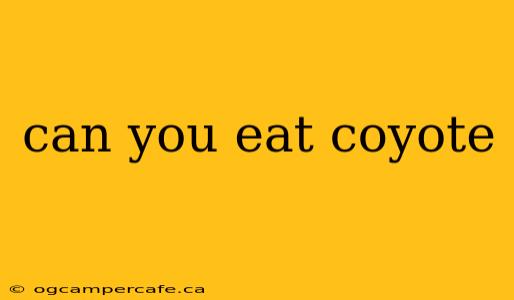Can You Eat Coyote? A Comprehensive Look at Coyote Consumption
The question of whether you can eat coyote is a complex one, touching upon culinary traditions, safety concerns, and ethical considerations. While technically possible, consuming coyote meat isn't a widespread practice, and there are significant factors to consider before doing so. This article delves into the practicalities and potential dangers involved in eating coyote.
Is Coyote Meat Safe to Eat?
The safety of eating coyote meat hinges primarily on proper handling and preparation. Coyotes are wild animals, and their meat can harbor parasites and bacteria, such as E. coli, Salmonella, and Trichinella. These pathogens can cause serious foodborne illness if the meat isn't thoroughly cooked to an internal temperature of at least 165°F (74°C). Improperly prepared coyote meat poses a significant risk to human health.
Furthermore, coyotes are scavengers, meaning their diet includes potentially contaminated food sources. This increases the likelihood of parasites and bacteria being present in their flesh. Hunting location also plays a role; coyotes in areas with environmental contamination might carry higher levels of toxins in their meat.
The Taste and Texture of Coyote Meat
Descriptions of coyote meat vary, with some comparing it to lean venison or dog meat. Many report a slightly gamey flavor, sometimes described as musky or strong. The texture is generally lean and tough, requiring slow cooking methods like stewing or braising to tenderize it properly. The overall palatability is subjective and depends heavily on preparation.
Legal and Ethical Considerations
Before even considering consuming coyote, it's crucial to understand the legalities surrounding hunting and consuming wildlife in your area. Hunting seasons, licensing requirements, and permitted methods vary widely by location. Hunting coyotes illegally can result in significant fines and legal repercussions.
Beyond the legal aspects, ethical considerations are paramount. Responsible hunting practices emphasize respect for the animal and minimizing suffering. If you choose to hunt and consume coyote, ensuring a clean and humane kill is essential.
Preparing Coyote Meat Safely
If you decide to proceed despite the inherent risks, meticulous preparation is vital. This involves:
- Proper Field Dressing: Cleanly removing the intestines and other organs promptly after the kill minimizes bacterial contamination.
- Thorough Cooking: As mentioned earlier, achieving an internal temperature of 165°F (74°C) is crucial for eliminating harmful bacteria and parasites.
- Freezing: Freezing the meat before cooking can help reduce the risk of parasite transmission.
Alternatives to Consuming Coyote
While some might find the prospect of eating coyote appealing for survival or cultural reasons, it's important to weigh the risks against the readily available alternatives. There are numerous other, safer, and more readily accessible protein sources that require less preparation and carry far less risk of foodborne illness.
Disclaimer: This information is for educational purposes only and should not be considered a recommendation to consume coyote meat. The risks associated with eating wild game are significant, and responsible individuals should prioritize their health and safety. Always consult with local wildlife experts and health officials before undertaking any activity involving the consumption of wild animals.
